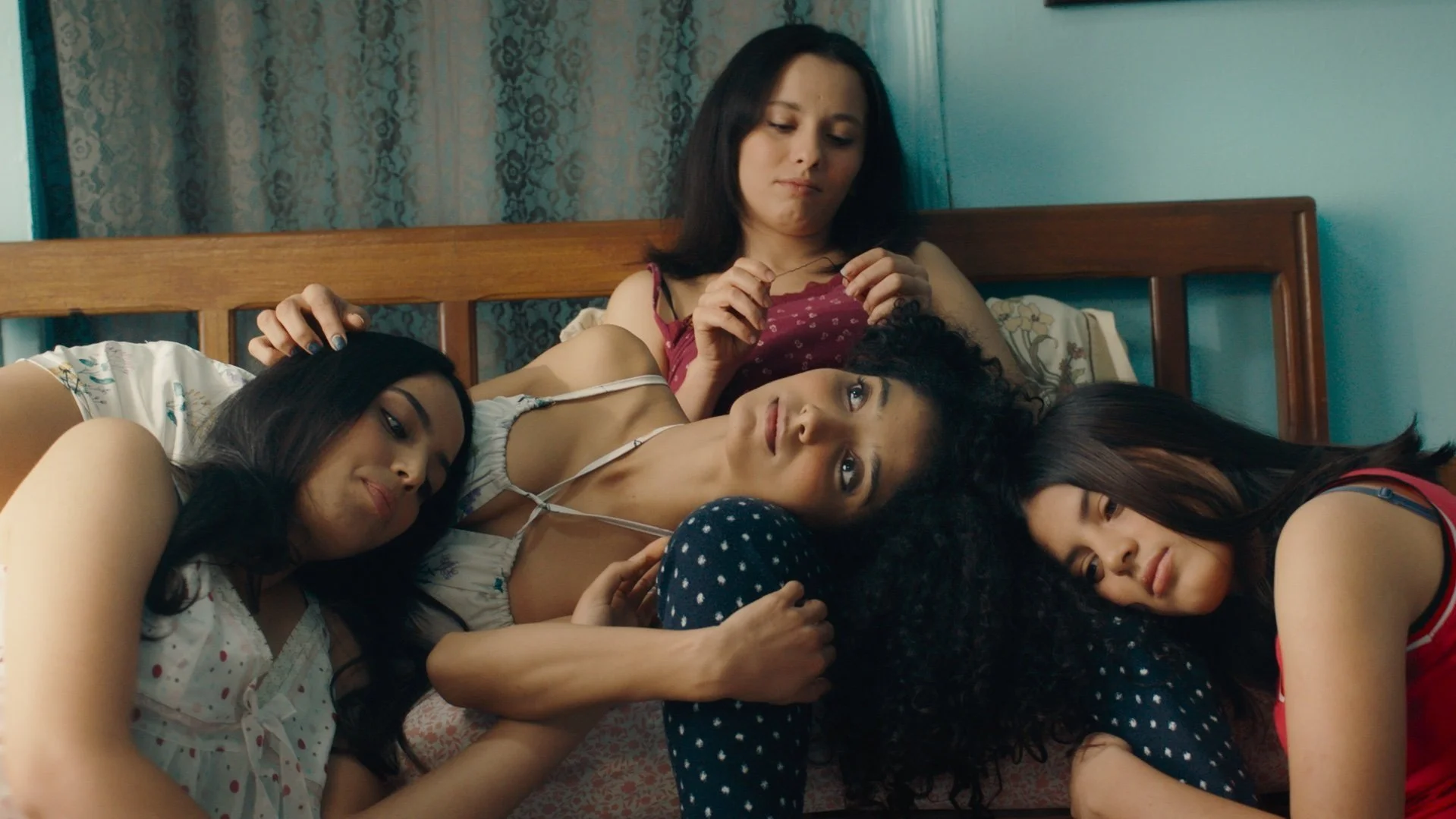Four Daughters
Kaouther Ben Hania’s Oscar-nominated docudrama from Tunisia is by turns disturbing and confusing.
Being adventurous can be risky for a filmmaker but it's an approach that has proved successful for Kaouther Ben Hania since it has brought her a striking number of nominations and many actual awards. Her latest work, Four Daughters, illustrates this very well since it is a contender for the 2024 Oscar for best documentary. Furthermore, it is not the first time that her work has competed for an Oscar, her drama The Man Who Sold His Skin having been a nominee for best international feature in 2021. This new work also involves a degree of dramatisation and, while the category in which it has been placed for the Oscars seems fair enough, Four Daughters has indeed been described as a docudrama. It is the film’s novel form which makes one describe it as adventurous, but whether or not that approach really benefits the material is perhaps an open question.
Ben Hania is herself Tunisian and her focus here is on a family living in that country whose lives were upturned by events that occurred in 2015. Olfa, the mother, was at that time bringing up four daughters on her own having divorced her husband. The oldest child, Ghofrane had been born in 1998 followed by Rahma in 1999 while the younger sisters, Eya and Tayssir, arrived in 2003 and 2005 respectively. The childhoods of all four were very much influenced by Olfa’s unhappy marriage. Their father had treated her badly even on their wedding night and his behaviour had encouraged Olfa to become overprotective of her daughters thus provoking feelings of resentment. But more disturbing by far was what happened when their mother took up with a new man, Wissem. At first, he appeared to be everything that Olfa was looking for in a man but a year on he turned his sexual attentions on more than one of the daughters.
As this background suggests much of Four Daughters is concerned with a mother’s problems in bringing up girls who in this modern age are likely to rebel if they feel that they are not free to follow their own inclinations. However, what made the situation headline news was the fact that the two older girls were in due course drawn into supporting the jihadist group Daesh with first Ghofrane and then Rahma leaving home to join them and not returning. For a filmmaker opting to tell their story in a documentary context there were inherent problems even though Olfa, Eya and Tayssir were willing to cooperate. Quite apart from Ghofrane and Rahma being absent, it was also the case that this was not a family with videos or home movies that could be incorporated to show those earlier times which were at the heart of the story.
What Ben Hania came up with was the idea of having Olfa, Eya and Tayssir on camera but also inviting them to re-enact for the film some of the past scenes in which they had participated. But, since it was recognised that some of the more distressing moments central to this might prove emotionally distressing were Olfa herself asked to replay them, the professional actress Hend Sabri was brought in so that she could stand in for Olfa in those scenes. Inevitably it was also necessary for two other players to be brought in to represent the teenage Ghofrane and Rahma. However, the concept for the film went beyond simply inserting dramatised reconstructions in this way since Ben Hania also chose to show footage of the preparations for the filming. Thus the two young daughters are shown meeting those who will portray their sisters and Hend Sabri is introduced to Olfa as the actress who will at times represent her.
This unorthodox approach certainly gives the viewer a sense of direct contact with Olfa, Eya and Tayssir and the talk that emerges in the present be it authentic or sometimes scripted (one is not always certain about that) brings one an impression of Tunisian life today. Similarly, we get a sense of the past from present recollections, from re-enactments and sometimes even from discussions about those re-enactments. For some this mix will be something refreshingly fresh compared to what we get in traditional documentaries, but what is already a complex and even slightly confusing treatment is rendered all the more so by the intercutting involved. Furthermore, we have to adjust also to the oddity that in the re-enactments it is the same actor, Majid Mastoura, who takes on all the male roles appearing in turn as Olfa’s husband, her lover Wissem and a police official. The story, itself hardly straightforward, loses rather than gains from this elaborate approach and I was left with the impression that to have told it in a truthful way but as a drama with actors would have made for a stronger and more readily involving film. However, I should record that, as its Oscar nomination indicates, there are those who find it easier to admire Four Daughters than I do. Indeed, it has already won awards including sharing the documentary prize, The Golden Eye, at the 2023 Cannes Film Festival.
Original title: Les filles d’Olfa.
MANSEL STIMPSON
Featuring Olfa Hamrouni, Eya Chikhaoui, Tayssir Chikhaoui, Hend Sabri, Nour Karoui, Ichraq Matar, Majid Mastoura.
Dir Kaouther Ben Hania, Pro Nadim Cheikhrouha, Martin Hempel, Thanassis Karathanos and Habib Attia, Screenplay Kaouther Ben Hania, Ph Farouk Laâridh, Pro Des Bessem Marzouk, Ed Jean Christophe Hym, Kaouther Ben Hania and Quitaiba Barhamji, Music Amin Bouhafa, Costumes Anissa Ghelala.
Tanit Films/Twenty Twenty Vision Filmproduktion/Cinétéléfilms/Jour2Fête-Modern Films.
107 mins. France/Tunisia/Germany/Saudi Arabia/Cyprus. 2023. UK Rel: 1 March 2024. Cert. TBC.


